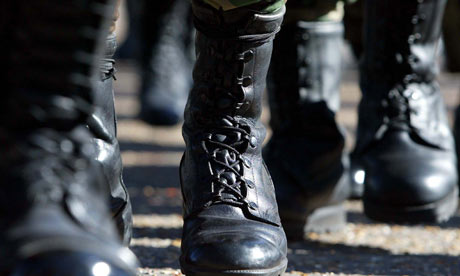For every person who acts out violently, there are undoubtedly many others who have the inclination but lack the resolve. That’s one of the many disturbing aspects of the story of Wade Michael Page, who gunned down unarmed Sikhs in Wisconsin.In my first Army assignment, I found myself serving with the 6th Psychological Operations Battalion at Fort Bragg in 1992, the same year that Page enlisted. Although I do not remember his name, it is distinctly possible we served in sister units—if not the same unit.It does not surprise me that Page fell into the white supremacist movement back then. At that time, at least at Fort Bragg, white supremacists were allowed to serve openly. It was not uncommon to come across banners and flags in the barracks displaying their obsession with racial purity, or to observe tattoos, mannerisms and looks all evidencing hatred.I find it eerie that Page found a home for his beliefs at the military base. I recall numerous attacks on black residents of Fayetteville (the nearby city we called Fayette Nam) by young white soldiers reported in the news. The attacks, which were always violent, seemed to be viewed by the command as mean pranks rather than something truly despicable.As young as I was—just 20, same as Wade—I assumed white supremacists serving openly were just an Army reality, something I would have to deal with as long as I remained in uniform. And I was right.To this day, supremacist tattoos, speech, mannerisms and especially bands all create in me instant feelings of despair and rage. I cannot banish from my mind memories of the angry music thumping behind closed doors in the barracks of Fort Bragg, a place I will always associate with depravity, hopeless ignorance and spiritual desolation.I am deeply ashamed that a fellow soldier committed this act of cowardice. But knowing his roots at Fort Bragg and peering back through the long lens of time, I can see his genesis. Knowing that I swam in the same pool that spawned him is something I have to live with. There are dark elements in a history with the military. I cannot avoid this fact.Like Page, I got into music. Not to spread venomous hatred but as therapy for injuries. After a collision in the mountains, I had to live in a plastic clam shell in which I could only move my arms. I bought a used drum set and spent hours pounding away in the basement. Eventually I became a member of a band, which I’m still in today. Instead of screaming about racial pride, we are a tolerant and accepting lot. Our name is generic: FM. I like to say that it does not stand for frequency modulation but for the Fukien Ministers, a self-selected delegation of 12 officials that went on a peace mission in ancient China and never returned.The Army trained Page to kill and allowed him a safe harbor for his supremacist beliefs. The path that led him to a Sikh temple in Wisconsin did not begin after he started playing hate music with a band, but when he listened to it at Fort Bragg, jumping up and down in the barracks, slipping cassettes to friends like little packets of steroids. Wade Michael Page—another trained chicken that has come home to roost.
Alex Escué Limkin served in the U.S. Army for 15 years, including a tour in Iraq from 2004 to 2005. He documents his experience as an Iraq veteran at warriorswithwesthusing.org.
The opinions expressed are solely those of the author.






